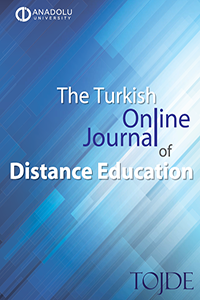Abstract
References
- Afendi, H., & Embi A. M. (2010). Constructivism in the design of online learning tools. European Journal of Educational Studies 2(3), 237 -246.
- Afonso, P., Ramos, M.R., Saraiva, S., Moreira, C.A., & Figueira, M. I. (2017). Assessing the relation between career satisfaction in psychiatry with lifelong learning and scientific activity. Psychiatry Research, 210- 214.
- Allam, A., Schulz, J. P., & Nakamoto, K. (2014). The impact of search engine selection and sorting criteria on vaccination beliefs and attitudes: Two experiments manipulating google output. Journal of Medical Internet Research, 16(4):e100.
- Annette. (2010, October 25). Can constructivist principals be applied to adult learning? Retrieved Sep 15, 2019, from http://constructivismetec522.pbworks.com/w/page/1845746/Adult%20and%20 Training%20Applications
- Armstrong, P. (2015). Effective partnerships and collaboration for school improvement: A review of the evidence. London: Department for Education.
- Atzori, L., Lera, A., & Morabito, G. (2010). The internet of things: A survey. Computer Networks, 54(15), 2787-805.
- Barab, S., Kling, R., & Gray, J. H. (2004). Designing for virtual communities in the service of learning. Cambridge, UK: Cambridge University Press.
- Billett, S. (1993). What’s in a Setting? Learning in the workplace. Australian Journal of Adult and Community Education, 1 (33), 4 -14.
- Billett, S. (1994). Situated learning-A workplace experience. Australian Journal of Adult and Community Education, 2 (34), 112 -130.
- Billett, S. (1996). Towards a model of workplace learning: The learning curriculum. Studies in Continuing Education, 1(18), 43-58.
- Bizon, C., & Istrate, A. (2017). Lifelong learning platforms based on social networks. Economy Informatics, 17 (1), 14 - 24.
CONSTRUCTIVIST THEORY AS A FOUNDATION FOR THE UTILIZATION OF DIGITAL TECHNOLOGY IN THE LIFELONG LEARNING PROCESS
Abstract
Lifelong learning, with the help of digital technology, possesses the capacity to offer individual significant
advantages to individual learners. This paper examines both the diverse approaches to lifelong learning
and the digital tools available to promote these strategies. The paper contains a review of some of the main
articles pertaining to the fields of constructivism, digital technology, and the process of lifelong learning.
Specifically, the authors intend to critically evaluate the utilization of rapidly developing digital technologies,
such as computers, tablets, and mobile devices, within lifelong learning and their role as tools in promoting
access to both practical and theoretical knowledge and in facilitating the communication of ideas within
a global network, as per the constructivist approach. Hence, this article relies upon a specific definition of
lifelong learning and an exploration of the notional foundation of what comprises lifelong learning and the
environment in which their knowledge acquisition occurs. Thus, a framework for the present research is
established wherein peer-reviewed studies concerning the use of social media by lifelong learners is explored,
and extrapolating from the dual tenets of professional development and adult learning theory. Moreover, the
authors additionally examine approaches to the notion of PLEs (personal learning environments) and PLNs
(personal learning networks) as related to the selection of relevant lifelong learning strategies. The discussion
is exemplified by cases ranging from video platforms to blogs and is simultaneously multidisciplinary and
spanning diverse fields. Each example has applicability for lifelong learning and represents the characteristics
of constructivism and its support within a web-based learning environment. It is thereby suggesting that
effective and meaningful strategies supportive of the lifelong learning lifestyle can be achieved via welldesigned
PLEs and PLNs.
Keywords
Lifelong learning constructivism digital technology personal learning environment professional learning network
References
- Afendi, H., & Embi A. M. (2010). Constructivism in the design of online learning tools. European Journal of Educational Studies 2(3), 237 -246.
- Afonso, P., Ramos, M.R., Saraiva, S., Moreira, C.A., & Figueira, M. I. (2017). Assessing the relation between career satisfaction in psychiatry with lifelong learning and scientific activity. Psychiatry Research, 210- 214.
- Allam, A., Schulz, J. P., & Nakamoto, K. (2014). The impact of search engine selection and sorting criteria on vaccination beliefs and attitudes: Two experiments manipulating google output. Journal of Medical Internet Research, 16(4):e100.
- Annette. (2010, October 25). Can constructivist principals be applied to adult learning? Retrieved Sep 15, 2019, from http://constructivismetec522.pbworks.com/w/page/1845746/Adult%20and%20 Training%20Applications
- Armstrong, P. (2015). Effective partnerships and collaboration for school improvement: A review of the evidence. London: Department for Education.
- Atzori, L., Lera, A., & Morabito, G. (2010). The internet of things: A survey. Computer Networks, 54(15), 2787-805.
- Barab, S., Kling, R., & Gray, J. H. (2004). Designing for virtual communities in the service of learning. Cambridge, UK: Cambridge University Press.
- Billett, S. (1993). What’s in a Setting? Learning in the workplace. Australian Journal of Adult and Community Education, 1 (33), 4 -14.
- Billett, S. (1994). Situated learning-A workplace experience. Australian Journal of Adult and Community Education, 2 (34), 112 -130.
- Billett, S. (1996). Towards a model of workplace learning: The learning curriculum. Studies in Continuing Education, 1(18), 43-58.
- Bizon, C., & Istrate, A. (2017). Lifelong learning platforms based on social networks. Economy Informatics, 17 (1), 14 - 24.
Details
| Primary Language | English |
|---|---|
| Journal Section | Articles |
| Authors | |
| Publication Date | October 1, 2020 |
| Submission Date | April 19, 2020 |
| Published in Issue | Year 2020 Volume: 21 Issue: 4 |


